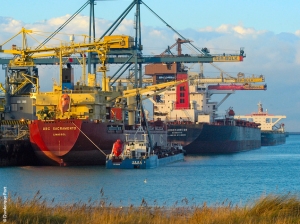


(Posted on 16/07/20)
Dunkerque-Port has joined the “Getting to Zero” Coalition, in order to support the decarbonisation of the shipping industry by working in conjunction with companies from the shipping, energy, infrastructure and finance sectors.
France's third-ranking port, Dunkerque-Port is well known as a port handling heavy bulk cargoes for its numerous industrial installations. Classified as the 7th port of the North Europe Range which extends from Le Havre to Hamburg, it is also France's leading port for ore and coal imports; France's leading port for containerised fruit imports; France's leading port for copper imports; and France's second-ranking port for trade with Great Britain.
The aim of the Coalition is to help reach the objective set by the International Maritime Organisation to reduce greenhouse gas emissions by shipping by at least 50% by 2050 (compared with the levels of 2008). To achieve this, through its members, the Coalition aims to commission zero-emission and commercially viable ocean-going vessels, powered by zero-emission fuels by 2030.
By participating in the “Fuels and Technologies” working group, the port's membership in the Coalition marks an additional step in Dunkerque-Port's commitment to its customers in the maritime sector and underlines its intent to act on their energy demand, by helping them to reduce their own emissions.
Dunkerque-Port intends to make its contribution to the Coalition by sharing its expertise, in particular on the strategic priorities of port infrastructure requirements for fuel storage and facilities for refuelling ships.
Referring to the membership, Stéphane Raison, President of the Executive Board of Dunkerque-Port stated: “By joining the "Getting to Zero" Coalition, we wish to support innovation and participate in the concerted action taken by all the stakeholders in the sector, thereby helping to more effectively reduce the carbon footprint of maritime transport. Ports are key locations for the development of infrastructures dedicated to the production of new zero-carbon energy sources for ships. The Port of Dunkerque aims to install low-carbon (LNG) and zero-carbon power production plants (Hydrogen, dimethyl ether (DME), renewable electricity) within its precinct over the next five years in order to fuel ships fitted with new engines.”
Launched during the United Nations Climate Action Summit organised in New York (USA) on 23 September 2019, the “Getting to Zero” Coalition is a partnership between the World Maritime Forum, “Friends of Ocean Action” and the World Economic Forum.
Abu Dhabi based AD Ports Group, a global enabler of integrated trade, transport, industry, and logistics... Read more
This year marks a significant milestone in maritime innovation as Port Hedland, Australia, celebrates... Read more
Associated British Ports (ABP), the UK’s leading port operator, has announced the latest tranche... Read more
During the Investment, Labour, and Trade Promotion Programme in Japan (November 16–22, 2025),... Read more
AD Ports Group subsidiary Khalifa Economic Zones Abu Dhabi - KEZAD Group, the largest operator of integrated... Read more
Abu Dhabi based AD Ports Group, a global enabler of integrated trade, transport, industry, and logistics... Read more
Peel Ports Group has achieved a 48% reduction in operational greenhouse gas emissions in the last five... Read more
The Trois-Rivières Port Authority (TRPA) in Canada has announced the appointment of Mr. Anick... Read more
Euroports commitment to continuously improving operational efficiency, enhancing workplace safety, and... Read more
Under the slogan ‘Your Intermodal Link Between China, Iberia and the Atlantic Markets,’... Read more